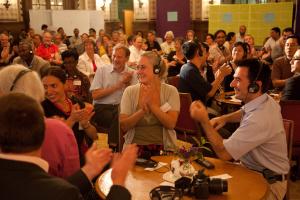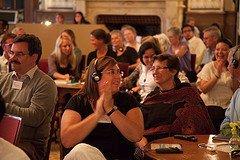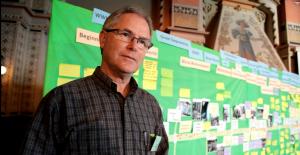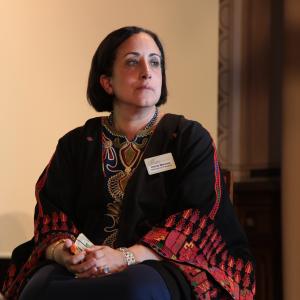Chris Breitenberg from USA, currently serving on the International Council of Initiatives of Change, gives his ‘wrap-up’ summary of the recently concluded Global Assembly.
 From 12-19 August, 102 representatives from 43 countries in the Initiatives of Change (IofC) global network met, discussed, reflected and decided in Caux, IofC’s conference centre in Switzerland. They came for IofC’s annual Global Assembly, spending a week together spanning a narrative arc – learning from the past, embracing the present and exploring the future.
From 12-19 August, 102 representatives from 43 countries in the Initiatives of Change (IofC) global network met, discussed, reflected and decided in Caux, IofC’s conference centre in Switzerland. They came for IofC’s annual Global Assembly, spending a week together spanning a narrative arc – learning from the past, embracing the present and exploring the future.
After an opening night celebration, representatives spent the first day ‘feeling the pulse’ of world events and IofC initiatives. Beginning at the country and continent level, a picture emerged of widespread, relevant grassroots efforts to create a just, peaceful and sustainable world - each starting with themselves. The linkages with IofC’s emerging focal themes – peacemaking, good governance and economic/environmental sustainablity – were clear.
This provided the backdrop for the overwhelming adoption of a new Framework for Common Action, the result of a nine-month global consultation exercise which has engaged dozens of IofC teams and hundreds of individuals. This Framework attempts to bring greater focus and cohesion to the international work of IofC. It establishes a new mission statement (“to inspire, equip and connect people to address world needs, starting with themselves”) and three focal themes for collective action:
- Peace and social cohesion by building trust and reconciliation across divides;
- Good governance at every level by developing a leadership culture based on moral integrity, compassion and selfless service;
- Economic justice and environmental sustainability by inspiring transformation of motives and behaviour.
Adoption of the Framework signals a move by the global network of IofC to seek increased impact in fewer areas. The next two days of the Global Assembly provided the space to explore possibilities for immediate international collaboration.
Following a participatory process, the delegates decided to pursue three ‘Common Actions’.
In response to requests for help from South Sudan, a conference and campaign for national reconciliation and just governance is being prepared. It will draw on IofC’s experience in trustbuilding and ethical leadership, and be supported by a trained mobile team being formed in early 2013 as a 'Workshop for Africa'.
IofC is also developing a global initiative, in partnership with the UN Convention to Combat Desertification (UNCCD), to address the conflicts and breakdown in trust which impede land restoration. With the loss of productive land a major global challenge, IofC’s efforts will be directed at grassroots trust-building initiatives, particularly in the Drylands where 80% of the world’s major conflicts are taking place, and at developing high-level dialogues where policy makers can meet in a non-partisan atmosphere to seek common next steps at the policy level.
A third new initiative is aimed at undergirding and expanding IofC’s burgeoning response to the need for ethical leadership and good governance in India.
 The Global Assembly concluded with the formal business meeting of IofC International. Several measures will be taken to help strengthen the capacity of IofC to deliver on these proposed actions.
The Global Assembly concluded with the formal business meeting of IofC International. Several measures will be taken to help strengthen the capacity of IofC to deliver on these proposed actions.
Sandwiched inside this forward-looking agenda was a 24-hour period spent ‘learning from the past and present’. This began with an evening hearing from three veterans of the movement - Pierre Spoerri, Digna Hintzen and Philippe Lasserre, who shared personal reflections from their life’s work. These set the tone of boldness and dedication.
 Next morning featured a collective ‘walk through history’, facilitated by Rob Corcoran, National Director of IofC USA. This celebrated many of the highpoints in the movement’s nearly 90-years of history, since it began as the ‘Oxford Group’, then evolving into Moral Rearmament and now Initiatives of Change. But some of the difficult moments were also expressed, times when people had been unintentionally hurt.
Next morning featured a collective ‘walk through history’, facilitated by Rob Corcoran, National Director of IofC USA. This celebrated many of the highpoints in the movement’s nearly 90-years of history, since it began as the ‘Oxford Group’, then evolving into Moral Rearmament and now Initiatives of Change. But some of the difficult moments were also expressed, times when people had been unintentionally hurt.
 This day of looking at the past culminated with five participants relating facets of their own experience in IofC, and with an acknowledgement of this shared past, made by Dr Omnia Marzouk, President of IofC International, on behalf of the International Council. (A full transcript is available here.)
This day of looking at the past culminated with five participants relating facets of their own experience in IofC, and with an acknowledgement of this shared past, made by Dr Omnia Marzouk, President of IofC International, on behalf of the International Council. (A full transcript is available here.)
All in all, the Global Assembly was a marking moment for IofC. Some called it a watershed moment for the organization.
As one participant said, ‘Our objective – to mobilize our movement into action that is more focused – is starting to happen.’


